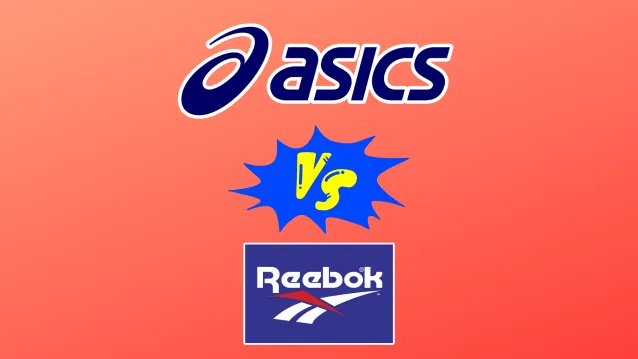As an avid shoe enthusiast, I often get asked – “which is better, ASICS or Reebok?” Both brands have been around for decades, catering to athletes and fitness enthusiasts around the world.
In this comprehensive face-off review, I’ll be comparing all elements of ASICS and Reebok to help you decide which athletic shoe brand ticks most boxes for your needs. Get ready for lots of details spanning comfort, price, durability, style, performance and more!
Comparison Table
| Category | ASICS | Reebok |
|---|---|---|
| Founded | 1949 | 1895 |
| Comfort | Exceptional cushioning and support. Accommodates neutral to overpronated feet. | Decent cushioning best for neutral feet and mild overpronators. Less support features. |
| Color Options | Wide range of vibrant, modern colors | Good variety but more classic, standard colors |
| Durability | Very durable materials withstand wear and tear | Durable for regular use but may breakdown with high mileage |
| Performance | Specialized technologies deliver responsiveness and control | Adequate performance technologies but less specialized than ASICS |
| Style | Contemporary, sporty to lifestyle designs on trend | Classic sporty style, clean and simple |
| Popularity | Extremely popular globally, dominates specialty stores | Less popular globally but recognized fashion brand |
| Best Seller | ASICS Gel-Kayano | Reebok Nano |
ASICS Overview
Asics was founded way back in 1949 by Kihachiro Onitsuka in Kobe, Japan.

The name “Asics” actually comes from the Latin phrase “anima sana in corpore sano,” which translates to “healthy soul in a healthy body.” Asics shoes really align with that mission, aiming to provide runners with equipment that enables peak performance.
Throughout its long history, Asics has continuously innovated and evolved its shoe technologies.
Key components that provide the renowned Asics fit and feel include the IGS (Impact Guidance System) for a natural gait cycle, Trusstic System tech for light stability, SpevaFoam cushioning for soft landings, and Dynamic DuoMax support for optimal alignment.
The outer soles utilize Asics’ specialized rubber compounds called AHAR (Asics High Abrasion Rubber) that hold up to heavy mileage on roads.
From fast, feather-light racing flats to well-cushioned trainers, Asics offers a diverse range of running shoe models to suit different needs.
But across the board, Asics shoes are known for their structured, classic look and feel.
If you want a running shoe with proven performance and durability from a brand that’s withstood the test of time, Asics is a solid choice.
Reebok Overview
With a long legacy spanning over 100 years, Reebok remains one of the most established and iconic athletic brands worldwide.
Founded in England in 1895 by Joseph William Foster, Reebok’s history dates back to innovations like the first spiked running shoe.

Now headquartered in Boston, Reebok engineers shoes for performance, comfort, and style across training, running, and everyday wear.
Reebok incorporates proprietary technologies like DMX Shear cushioning and Floatride Energy foam to provide both cushioning and responsiveness.
With pressure mapping and Memory Tech Massage footbeds, many Reebok shoes contour precisely to the shape of the foot for a truly customized fit and feel.
The brand also remains committed to sustainability, using recycled materials in over 75% of product lines. From vintage styles like the Freestyle to fitness must-haves like the Nano, Reebok’s timeless sporty designs have universal appeal.
With both substance and style, Reebok continues pushing boundaries while staying true to its classic roots.
Major Differences Between the Brands
Comfort & Fit
Reebok shoes fit true to size for the most part but some may be on the narrower side. With ASICS, it’s important to try shoes in-store for best fit as sizing can vary across models.
For runners with medium or high arches, ASICS provides better comfort and arch support due to its meticulous attention to anatomical fit. Reebok works fine for mild overpronators but ASICS has superior stability mechanisms that prevent excess inward foot rolling for more comfort.
Durability & Performance
ASICS investing heavily in research yields impressive functional improvements that support athletes reach peak performance without injury or discomfort. For high mileage runners especially, ASICS lasts far longer than most brands before signs of midsole compression or wear patterns appear.
Reebok is plenty durable for moderate exercise but their foam cushioning tends to lose responsiveness compared to ASICS specialized midsole compounds. The Japanese brand also offers far more performance features to improve speed, economy and precision.
Price
Across comparable categories, Reebok shoes retail for $20 – $30 less on average versus ASICS. With that said, both brands offer shoes spanning entry-level basics around $60 up to $250+ for top-tier options laden with features.
Reebok discounts older models more aggressively whereas ASICS maintains consistent pricing with limited sales or markdowns outside outlet stores. Ultimately Reebok wins on budget while ASICS justifies their higher price tags with elite levels of technology, quality and performance.
Design & Style
Reebok keeps it simple and classic in looks department – think white or black leather tennis shoes that never truly go out of fashion. ASICS has bolder aesthetics taking cues from streetstyle and high fashion trends.
Their catalog incorporates loud colors, prints, knits, woven materials and sculptural tooling that turn heads at the gym and beyond. Both brands offer shoes targeting lifestyle vs performance so choice comes down purely to personal tastes.
Popularity
It’s undeniable that ASICS now leads the athletic shoe industry especially among runners while Reebok has taken a backseat as a sports brand. Go to any road race or marathon expo and you’ll see participants armed with ASICS gear or racing in the dynamic MetaRide, MetaSpeed Sky or other technology-packed models.
Beyond performance, ASICS lifestyle silhouettes like the GEL-Lyte III also enjoy cult status on streets around the globe. Reebok still enjoys strong casual wear market share but their training shoes cater more to gym-goers over hardcore athletes compared to ASICS.
Target Market
Reebok targets a younger audience focused more on lifestyle, streetwear and casual shoes rather than extreme performance. ASICS directly connects with serious runners, coaches and podiatrists to engineer solutions that give dedicated athletes an edge.
Reebok shoes work reasonably well for new gym-goers getting into recreational fitness while ASICS excels at helping performance plateaus push even higher through biomechanical improvements. Ultimately ASICS speaks the language of experienced athletes intensely focused on PBs and medals over aesthetics or trends.
Performance Comparison
For Nurses
With nurses logging serious mileage during long shifts, ASICS offers superior comfort and support to alleviate pain. A stability shoe like the Gel-Kayano can specifically help those who overpronate and deal with knee or back issues as a result. Technologies like FluidRide® and Rearfoot GEL® provide excellent cushioning for nurses who stand and walk all day.
For Walking
Reebok shoes work reasonably well for short strolls but their basic EVA foam cushioning compresses with high mileage leading to discomfort.
For fitness walkers or those aiming for 10,000+ daily steps, the ASICS patented Gel cushioning system maintains its shock-absorbing properties far longer while also providing guidance and stability on uneven terrain.
Popular models like the GEL-Tech Walker Neo are specially engineered to meet the needs of recreational walkers across all fitness levels.
For Running
Serious runners need look no further than ASICS industry-leading innovations purpose-built to help overcome obstacles that hinder performance. Reebok lacks equivalents for game-changing technologies like Guidance Line® that improve gait efficiency and MetaRocker geometry to propel you forward smoothly.
Whether your goal is to finish a 5K under 30 minutes or qualify for Boston, ASICS’ unmatched understanding of biomechanics gives you the best gear to outrun the competition.
For Flat Feet
If fallen arches or overpronation are causing pain, ASICS motion control shoes can provide solid stability and arch support with features like medial posts and dual-density midsoles preventing inward roll of feet.
Reebok fits the bill for those with mild cases but people with flat feet need proper control which ASICS is better equipped to provide through guiding the feet’s natural motion while preventing excess movement.
For Back Pain
Proper cushioning and arch support are vital for minimizing back pain by promoting better posture and alignment during movement. With exceptional shock attenuation from rearfoot and forefoot Gel, ASICS helps take pressure off the back.
Lightweight shoes like Gel Cumulus allow free movement without causing fatigue over time. Reebok lacks advanced cushioning so feet and back have to work harder, risking aches.
For Standing All Day
Spending hours on your feet demands next-level comfort which ASICS delivers even in basic models like Gel Excite targeting value buyers. Reebok Retro shoes for example just can’t provide the continuous padded feeling underfoot thanks to budget EVA foam that compacts easily. For nurses, retail workers and others on their feet hour after hour, ASICS Gel and FlyteFoam compounds maintain plush feeling preventing fatigue.
For High Arches
Reebok shoes work reasonably well for medium arched feet but those with high insteps prone to supination need additional padded ankle collar and tongue. Otherwise shoes feel too shallow, causing rubbing against ankles and top of foot.
ASICS accounts for high arches and low volume feet with adjustable lacing systems and ultra plush, cumulative collars. So for those genetically prone to underpronation, ASICS far better accommodates high arches.
For Hiking
With trail terrain constantly varying underfoot, ASICS offers vastly superior traction, control and stability to handle unpredictable hiking conditions. The brand’s trail running pedigree results in outsoles with multi-directional gripping lugs, toe bumpers to protect from rocks and lower profile platforms. Reebok trails shoes rely on basic lug patterns more suited to groomed parks rather than scaling rocky bluffs or muddy inclines.
For Plantar Fasciitis
Reebok lacks advanced cushioning technologies so those experiencing chronic heel pain will likely want to look towards ASICS instead. GEL pads in the rearfoot coupled with plush foam midsoles provide exceptional shock attenuation right where plantar fasciitis sufferers need it most – under the heel. Lightweight builds also prevent foot fatigue over the course of a run so ASICS is the obvious solution for managing this stubborn injury.
Final Verdict
At the end of the day, while Reebok offers classic sport-inspired style and reasonable performance for casual fitness enthusiasts, ASICS stands unmatched when it comes to meeting needs of serious athletes. The brand’s intense focus on innovative technologies created in partnership with athletes and researchers gives them an undeniable competitive edge.
So if you prioritize gear engineered to provide biomechanical improvements tailored to your specific sport, foot type or performance goals, invest in ASICS. But for those who care more about aesthetics and comfort during moderate training, Reebok remains an icon although well behind ASICS regarding true athletic performance.
Ultimately there’s a reason why you’ll spot ASICS on feet of record-breaking elites yet hardly ever see Reebok podium topping races or competitions. When each stride, second and millimeter counts, trust the technical mastery and precision of ASICS to give you every possible advantage.

